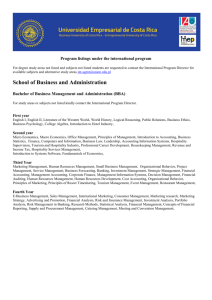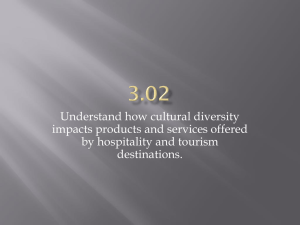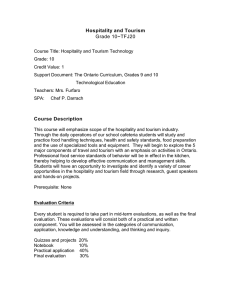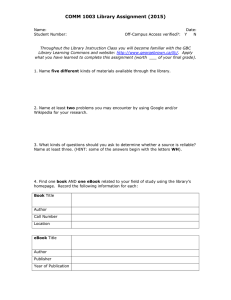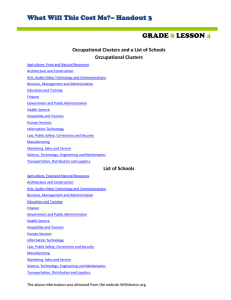STH 402-01: R H
advertisement
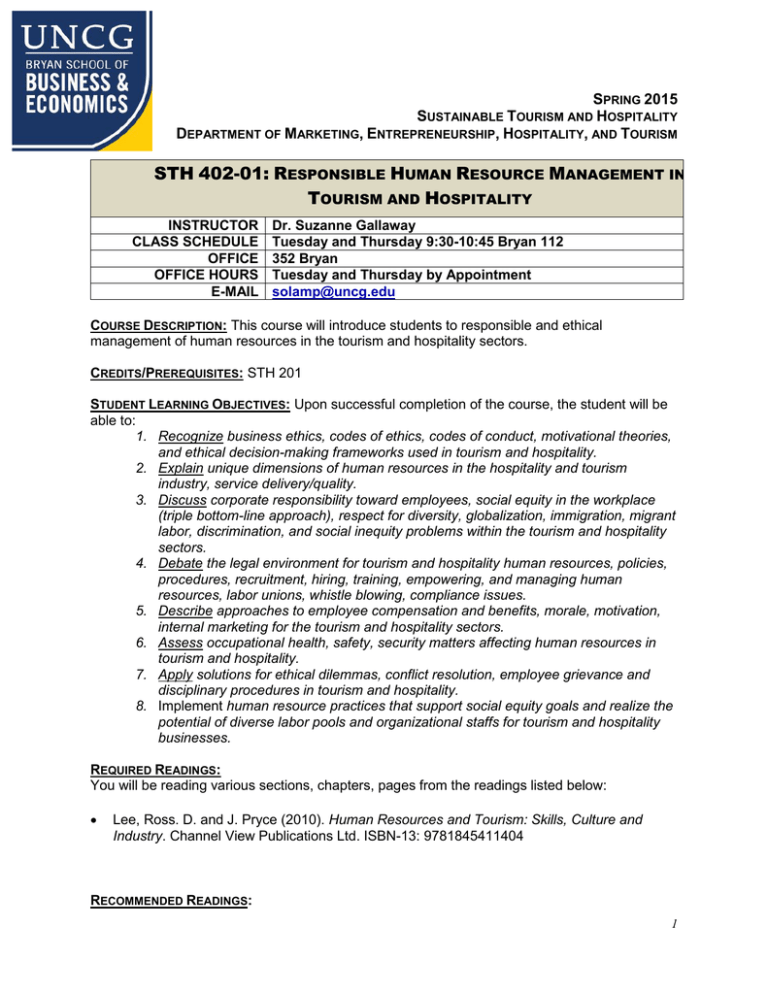
SPRING 2015 SUSTAINABLE TOURISM AND HOSPITALITY DEPARTMENT OF MARKETING, ENTREPRENEURSHIP, HOSPITALITY, AND TOURISM STH 402-01: RESPONSIBLE HUMAN RESOURCE MANAGEMENT IN TOURISM AND HOSPITALITY INSTRUCTOR CLASS SCHEDULE OFFICE OFFICE HOURS E-MAIL Dr. Suzanne Gallaway Tuesday and Thursday 9:30-10:45 Bryan 112 352 Bryan Tuesday and Thursday by Appointment solamp@uncg.edu COURSE DESCRIPTION: This course will introduce students to responsible and ethical management of human resources in the tourism and hospitality sectors. CREDITS/PREREQUISITES: STH 201 STUDENT LEARNING OBJECTIVES: Upon successful completion of the course, the student will be able to: 1. Recognize business ethics, codes of ethics, codes of conduct, motivational theories, and ethical decision-making frameworks used in tourism and hospitality. 2. Explain unique dimensions of human resources in the hospitality and tourism industry, service delivery/quality. 3. Discuss corporate responsibility toward employees, social equity in the workplace (triple bottom-line approach), respect for diversity, globalization, immigration, migrant labor, discrimination, and social inequity problems within the tourism and hospitality sectors. 4. Debate the legal environment for tourism and hospitality human resources, policies, procedures, recruitment, hiring, training, empowering, and managing human resources, labor unions, whistle blowing, compliance issues. 5. Describe approaches to employee compensation and benefits, morale, motivation, internal marketing for the tourism and hospitality sectors. 6. Assess occupational health, safety, security matters affecting human resources in tourism and hospitality. 7. Apply solutions for ethical dilemmas, conflict resolution, employee grievance and disciplinary procedures in tourism and hospitality. 8. Implement human resource practices that support social equity goals and realize the potential of diverse labor pools and organizational staffs for tourism and hospitality businesses. REQUIRED READINGS: You will be reading various sections, chapters, pages from the readings listed below: Lee, Ross. D. and J. Pryce (2010). Human Resources and Tourism: Skills, Culture and Industry. Channel View Publications Ltd. ISBN-13: 9781845411404 RECOMMENDED READINGS: 1 Collins, D. (2009). Essentials of Business Ethics: Creating an Organization of High Integrity and Superior Performance. Hoboken, NJ: John Wiley & Sons, Inc. Sommerville, K.L. (2007). Hospitality Employee Management and Supervision: Concepts and Practical Applications. Hoboken, NJ: John Wiley & Sons, Inc. Go, F.M., Monachello, M.L., and T. Baum (1996*). Human Resource Management in the Hospitality Industry. New York, NY: John Wiley & Sons, Inc. Hayes, D.K. and J.D. Ninemeier (2009). Human Resources Management in the Hospitality Industry. Hoboken, NJ: John Wiley & Sons, Inc. Riley, M. (1996*). Human Resource Management in the Hospitality and Tourism Industry (2nd Edition). Woburn, MA: Butterworth-Heinemann. Scoville, J.G. and J.W. Budd (Eds.) (2005*). The Ethics of Human Resources and Industrial Relations. Champaign, IL: Labor and Employment Relations Association. USEFUL WEBSITES http://www.shrm.org/pages/default.aspx http://www.ilo.org/global/lang--en/index.htm COURSE REQUIREMENTS: Your final grade will be determined by how well you fulfill course requirements. Your grade will be based on: Exams (60% of total grade): To evaluate student understanding of the key concepts and terms discussed and used in class, three exams will be given. The exams will be on the material covered during the semester (in class, in assigned readings). Exam questions may include a variety of formats: true/false, multiple choice, short answer, short essay. Exam 1 will address SLOs 1-2; Exam 2 will address SLOs 1-4; Exam 3 will address SLOs 1-6. Case Studies (30% of total grade): Students will be assigned three case studies one on HRM in tourism in general and two on ethical dilemmas faced by hospitality and tourism human resource managers. Students will answer questions, evaluate and present each case and then participate in a class discussion on each case. This activity will address SLOs 3 and 7. Assignment/Activity 3 exams 3 case studies Participation/Activities Total SLOs measured in this activity (Identify the # from your SLOs list above) 1 through 8 % of Final Grade Or Points Possible 60% 2, 3, 7 30% 1 through 8 10% 100% Directions for each assignment will be posted on Blackboard. In addition, rubrics and other evaluative instruments will be posted on Blackboard. Thus, students will know exactly what they are to accomplish in this class as well as how their grade will be determined. You will receive a score of 0 for any work not submitted. Late work will not be accepted. To receive credit for the course, you must earn a letter grade of D- or higher on the weighted average of all assigned course work (e.g., exams, assignments, discussion postings, etc.). Your final grade in the course will be a letter grade. Letter grade equivalents for numerical grades are as follows: EVALUATION/GRADING SCALE 2 97-100% 94-96% 90-93% 87-89% 83-86% 80-82% A+ A AB+ B B- 77-79% 74-76% 70-73% 67-69% 63-66% 60-62% <59% C+ C CD+ D DF COURSE OUTLINE (SUBJECT TO CHANGE): WK DATE 1 1/12-1/18 Course intro. and getting to know one another 2 1/19-1/25 3 1/26-2/1 Human Resources Management and the Tourism Context Contemporary Human Resources Planning 4 2/2-2/8 TOPICS and VIDEOS (*) Management and Appraisal 5 2/9-2/15 Management and Appraisal continued 6 2/16-2/22 Case Studies (page 38) 7 Training and Development 8 02/233/01 3/2-3/8 9 10 3/9-3/15 3/16-3/22 Spring Break Industrial Relations and Legal Aspects 11 3/23-3/29 Case Studies 12 3/30-4/5 Diversity Management 13 4/6-4/12 14 4/13-4/19 Human Resource Management and the Role of Ethics Future trends in tourism and hospitality human resources. Quality of Work Life REQUIRED READINGS/ASSIGNMENTS: READ: Chapter 1 Discussion Activity READ: Chapter 2 Discussion Activity READ: Chapter 3 Bring a job description to class Discussion Activity READ: Chapter 4 Discussion Activity Exam 1 READ: Chapter 5 Discussion Activity READ: Chapter 6 Discussion Activity READ: Chapter 7 Discussion Activity Exam 2: See Canvas READ: Chapter 8 Discussion Activity READ: Chapter 9 Discussion Activity READ: Chapter 10 Discussion Activity Case Studies 15 4/20-4/26 Exam 3 16 4/26-4/28 (*) Course material will be adjusted according to the flow of material in the class. We may spend more time on some issues and less time on others, depending on student need. A number of class periods will be partially turned into workshops to apply course material to course projects. 3 COURSE POLICIES: 1. Academic Integrity: Students are expected to be familiar with and adhere to UNCG’s Academic Integrity Policy on all assignments and examinations (http://academicintegrity.uncg.edu/complete). 2. Participation/Preparation: Meaningful participation and being prepared for class (having completed readings prior to due date) are all expected. Failure to submit an assignment, quiz, or project by the due date will result in a grade of Zero. Late work will not be accepted. 3. Email communication: When you email me, please use “STH-402-01 your last name” in the subject heading and use proper email etiquette when addressing/signing your messages. Unsigned/unclear emails will not receive replies. 4. Special needs: Should you have special needs related to a qualified/certified disability, please notify me by the end of the 2nd week of classes so that arrangements can be made to meet those needs. 4
